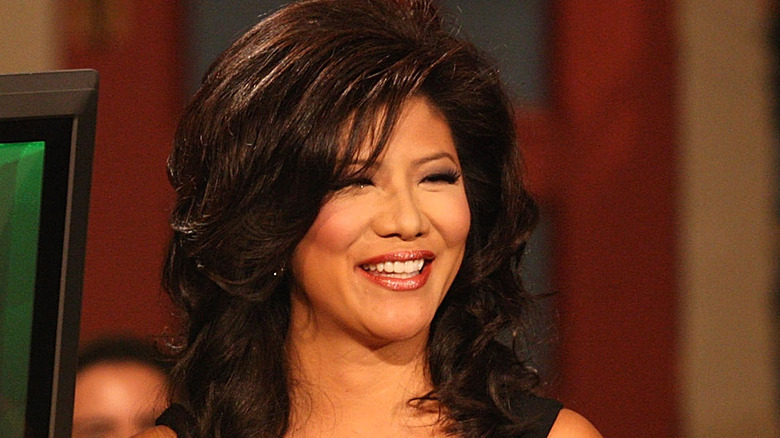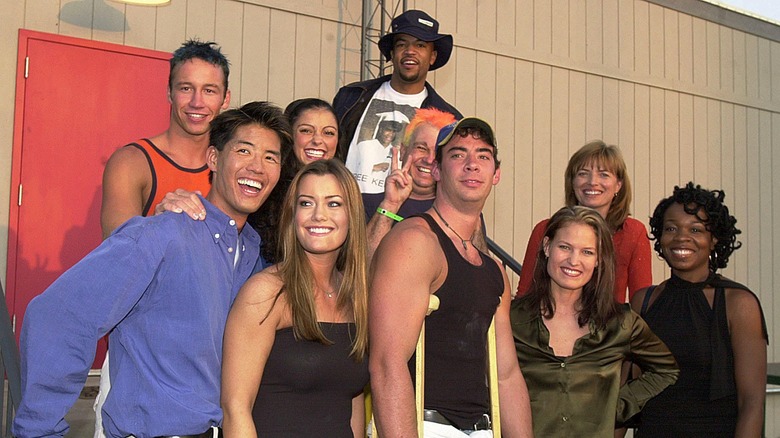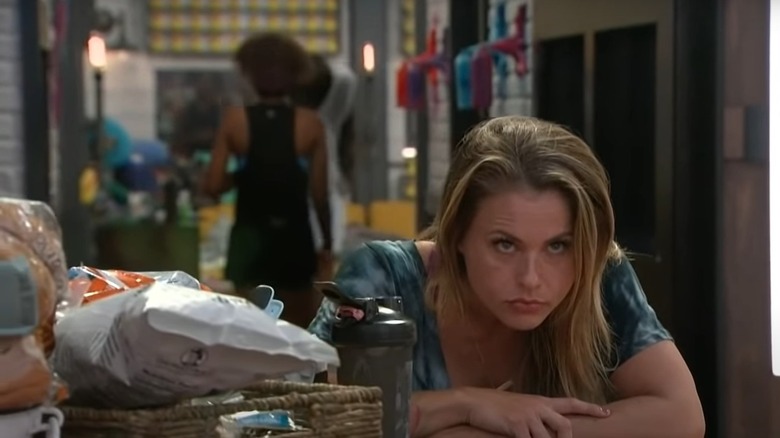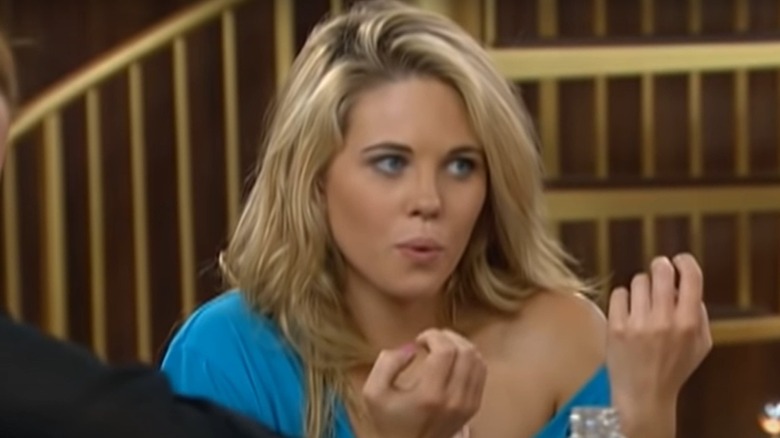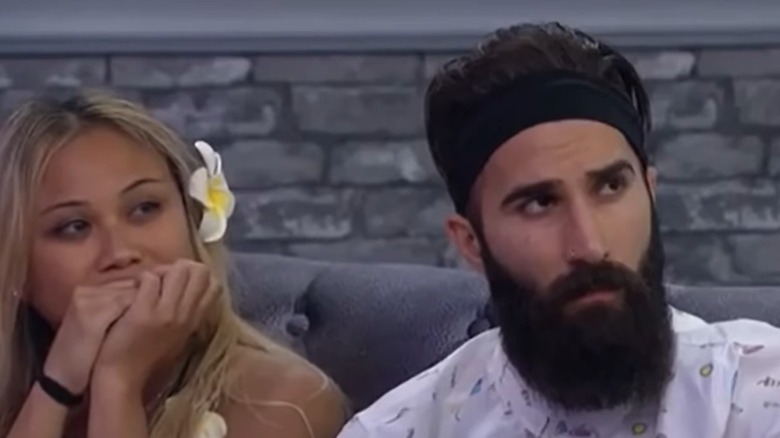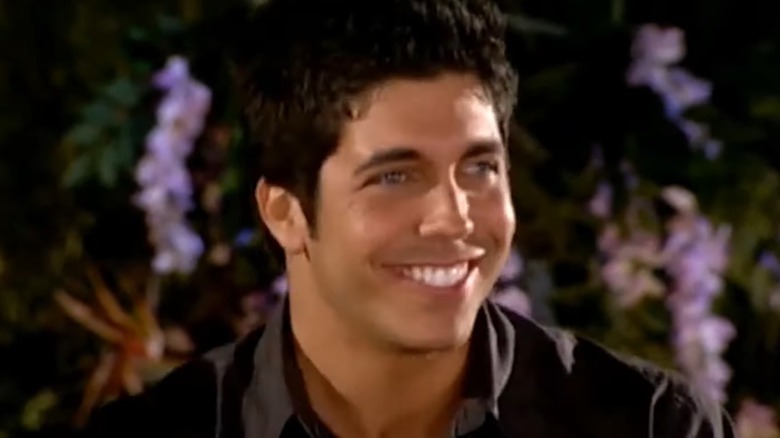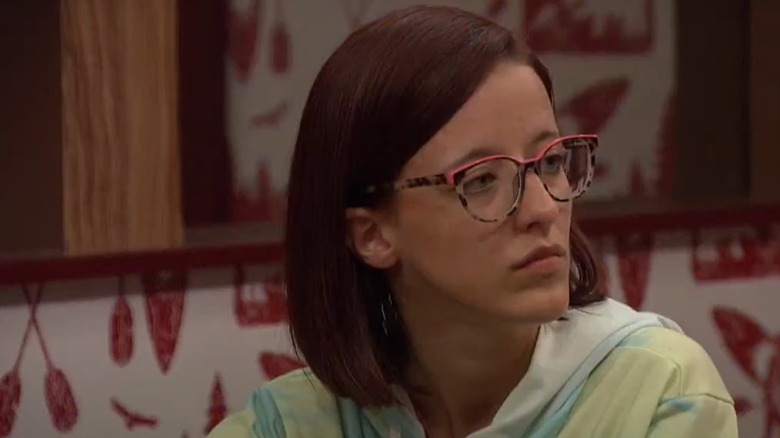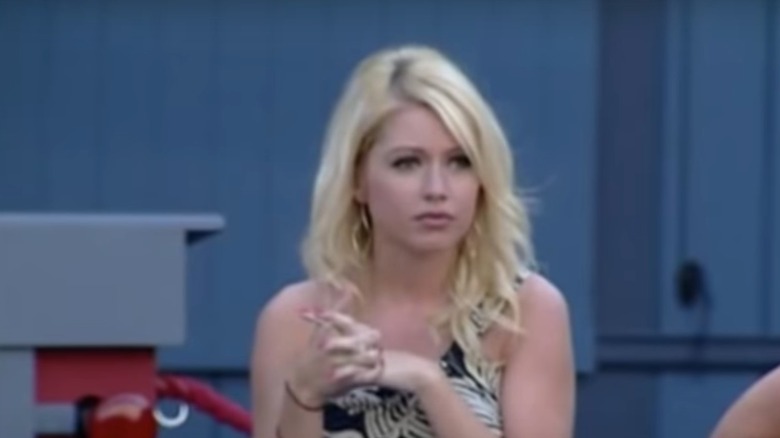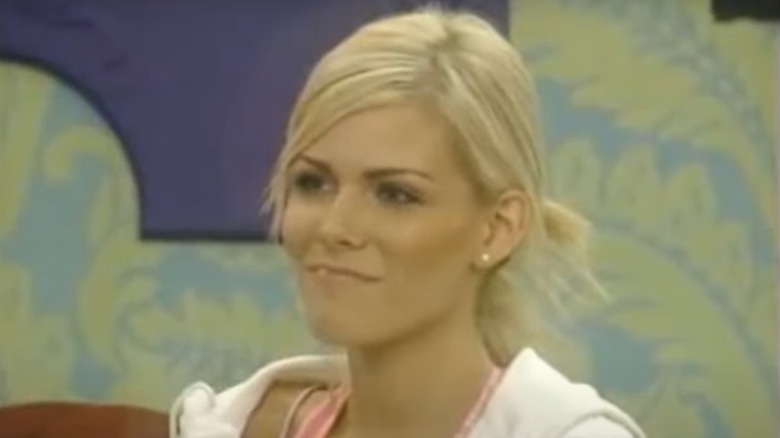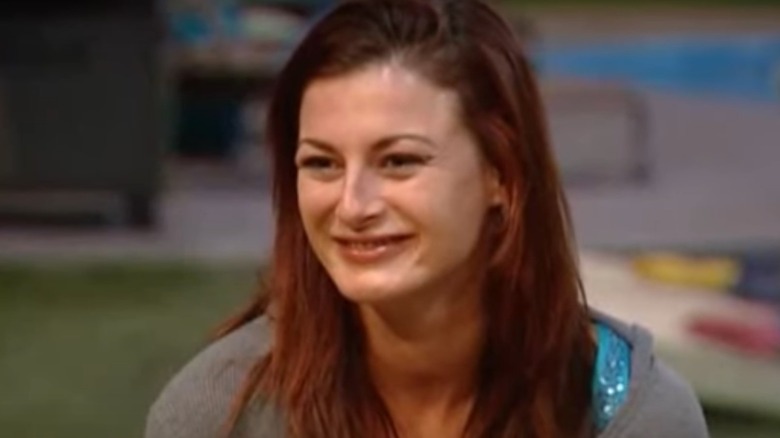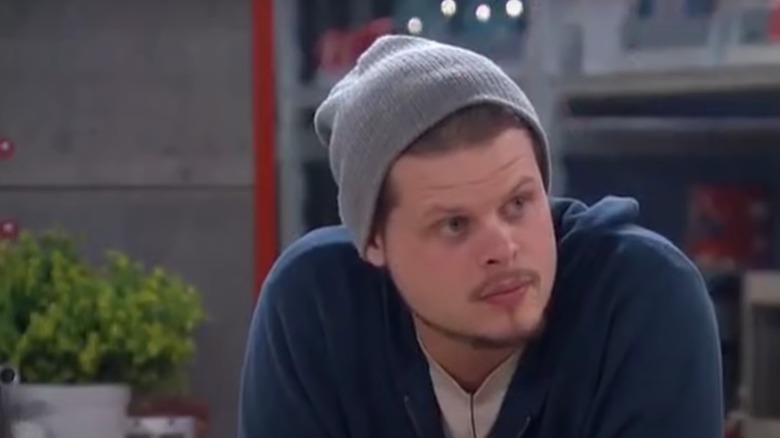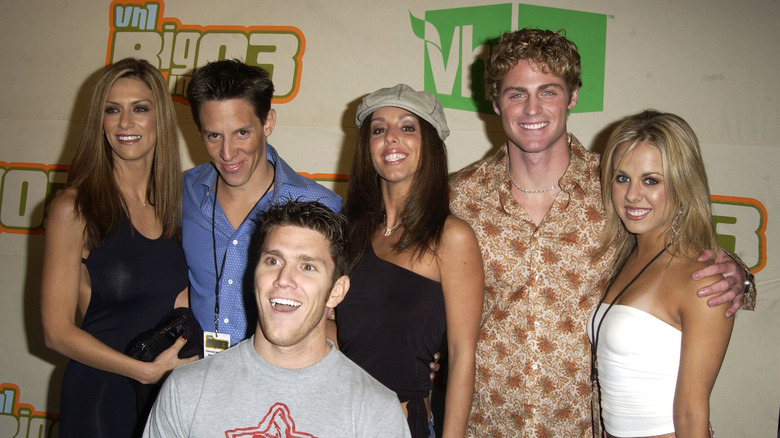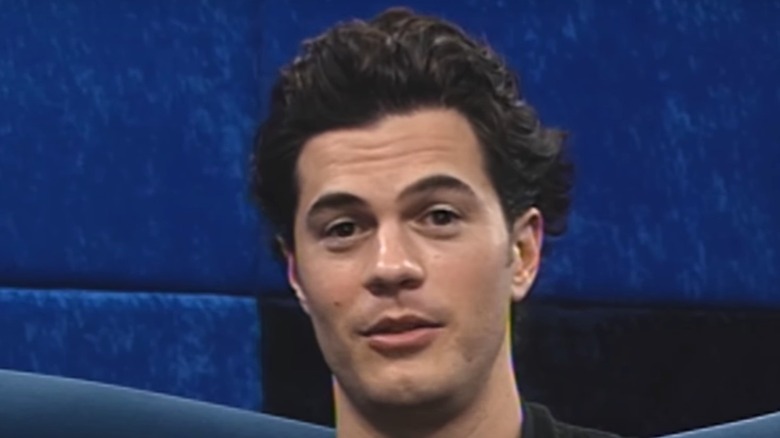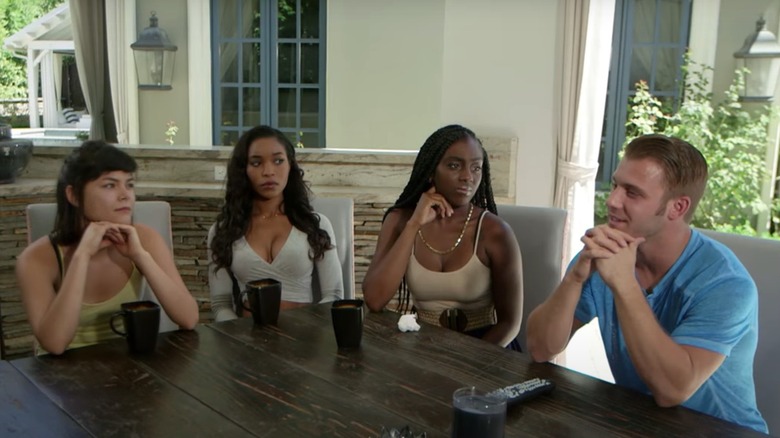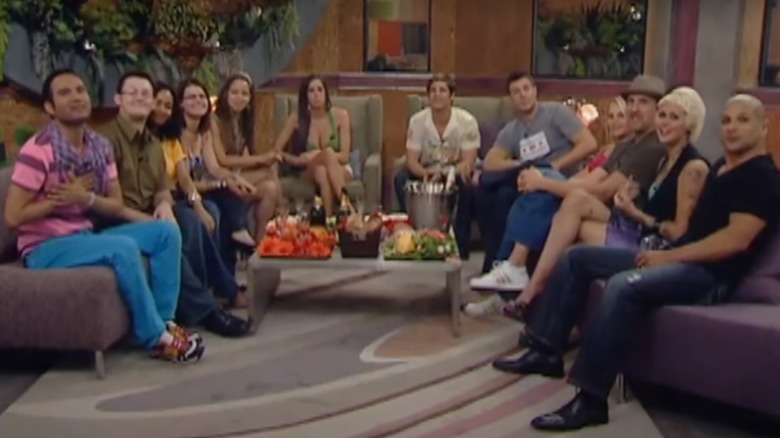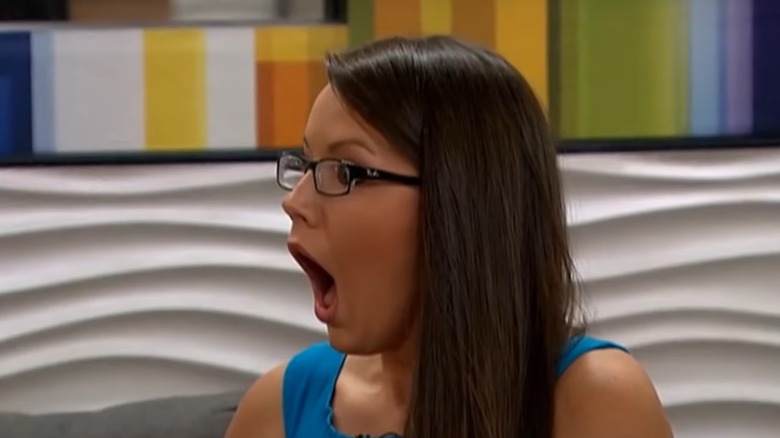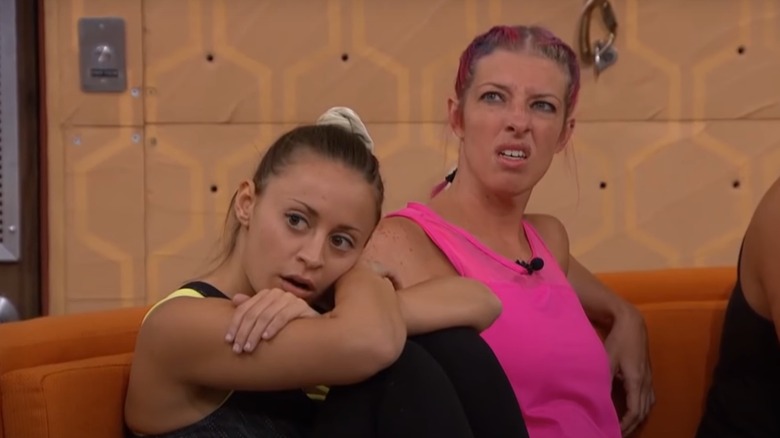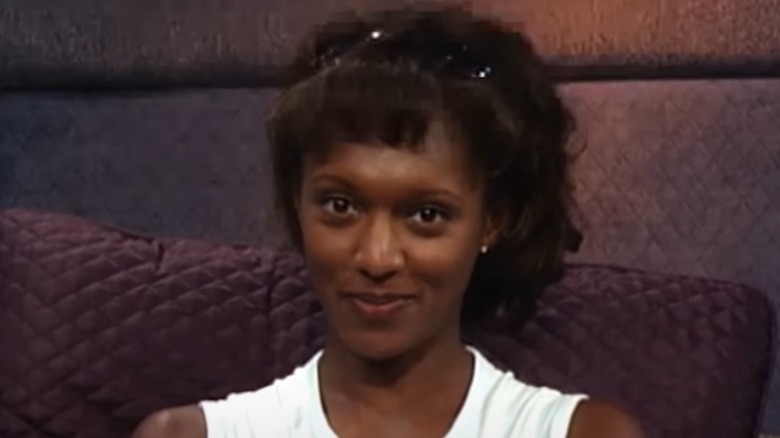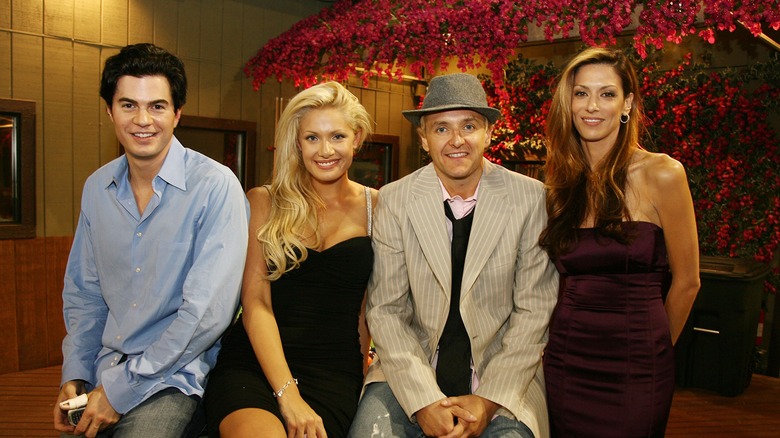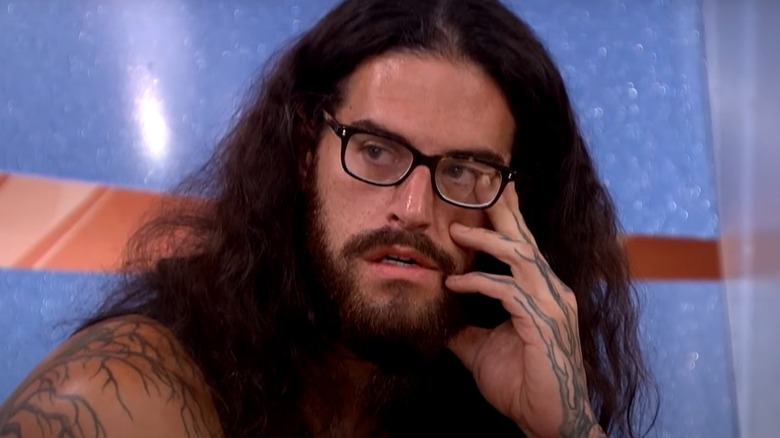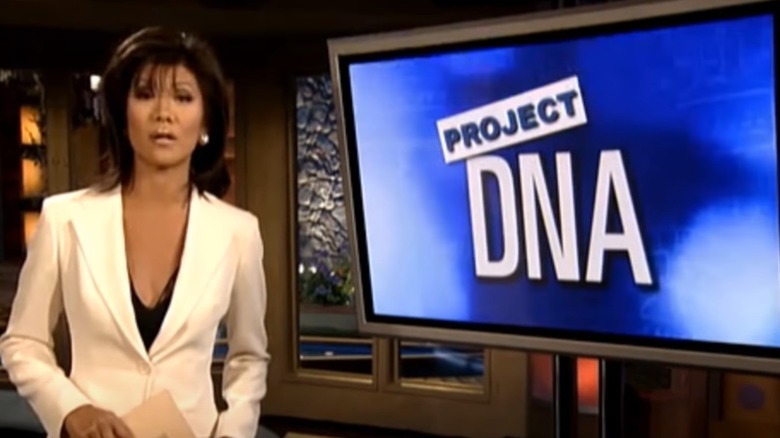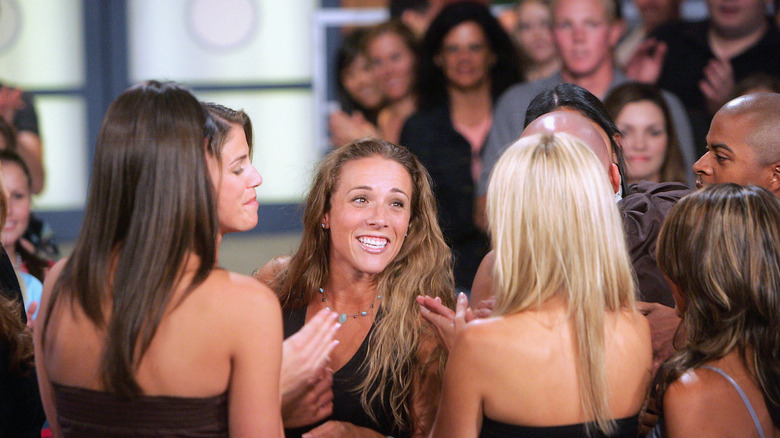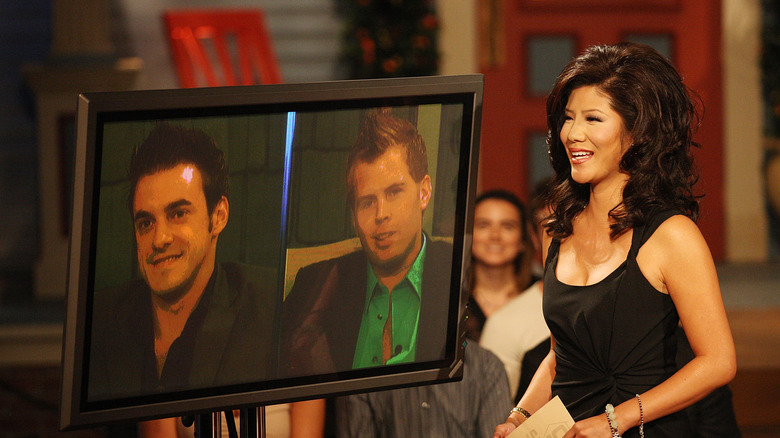Every Big Brother Season Ranked Worst To Best
CBS' "Big Brother" has become a staple of summertime programming. Adapted from the popular international franchise of the same name, the series puts a group of people together inside a house with no contact from the outside world. Every week, the houseguests have to compete for power and safety, adapt to each season's specific game-changing twists, and evict each other one by one until one houseguest remains to claim the $500,00 prize. Viewers can follow their favorite houseguests either on weekly broadcasts or on the show's 24/7 live feeds.
The series has aired 22 seasons since its debut in 2000 and produced two spin-off shows: the online-only "Big Brother: Over the Top" and the star-studded "Celebrity Big Brother." Over the course of the franchise's run, many memorable houseguests have entered the house and made a huge impact on the show. Each season of "Big Brother" brings something new to the table, though some are definitely better than others.
With Season 23 on the way, here are all of the "Big Brother" seasons ranked from worst to best. Rankings are based mostly on the quality of the cast, and whether or not they brought a good balance of gameplay and entertainment value to the season, as well as if each season's twists.
22. Season 1 (2000)
The first season of any reality show is going to be rough. The inaugural run of "Big Brother" was no exception. It was a far cry from the strategic game that the series is known as today. This season featured 10 houseguests living in a house together and performing weekly tasks to earn more money and privileges. Each week, all the houseguests nominated two people for banishment, with the two getting the most votes up for elimination. Viewers then voted on which houseguest they wanted to see evicted, and eventually voted on who they wanted to win.
This format is the one most commonly associated with the original international version, but it didn't translate well when it came to the United States. Critics and fans got tired of this season very quickly, especially its forgettable cast. In fact, the only houseguest from this season who appeared a second time was "Chicken" George Boswell, who was brought back to compete on the first All-Stars season. The franchise was able to redeem itself in future seasons by changing up the format and adding weekly competitions and prizes to spice things up.
21. Season 22: All-Stars 2 (2020)
CBS deserves some credit for managing to pull off a season of "Big Brother" during the COVID-19 pandemic. After suffering delays until late summer, "All-Stars 2" brought back 16 players across multiple generations of the show to compete once again. While many members of the cast were questionable, including the addition of a houseguest from last season who was the first one eliminated, the cast featured plenty of fan favorites like Ian Terry, Janelle Pierzina, Da'Vonne Rogers, and Kaysar Ridha.
Unfortunately, things went south very quickly. The season's main power alliance, The Committee, won every competition, dictated every nomination ceremony, and controlled every eviction vote. This led to boring and predictable gameplay, with no real surprises and a very obvious winner. Even the season's twists, such as extra safety competitions and the first-ever triple eviction, didn't add any excitement to the narrative.
In addition to being bereft of entertainment value, Season 22 was rife with controversy. Several houseguests made insensitive comments, particularly regarding Ian Terry's autism. The optics of the season's elimination order were also bad, with the women and houseguests of color being systematically eliminated nearly every week. "Big Brother" has always had issues regarding racism and prejudice, but this was the season that finally encouraged CBS to adopt a more diverse casting process.
20. Season 15 (2013)
Speaking of issues with racism, Season 15 of "Big Brother" made national headlines for all the wrong reasons when certain houseguests made bigoted remarks against other players. The houseguests at the center of this controversy received severe backlash for their comments and even lost their jobs outside the game. The rest of the cast didn't fare too well either, with many of the more likeable houseguests either getting eliminated too early or failing to make much of an impact. While the season does have a handful of decent blindsides and competitions, the houseguests' negativity leaves a dark cloud over the proceedings.
The season's twist also fell flat, with viewers voting each week to nominate an MVP to secretly nominate another houseguest. The twist seemed specifically designed for houseguest Elissa Slater, the sister of former houseguest Rachel Reilly, to get the title every week. Eventually, viewers made the nominations instead, but the damage was already done.
Since nobody from this season has been asked back for a future season, it seems like CBS would rather people forget this season ever happened.
19. Season 19 (2017)
Seeing former houseguests return to play the game again should be fun, but mixing them with new players can sometimes lead to disappointing results. Nowhere is this more evident than Season 19, which featured 16 new houseguests competing with Season 18 veteran Paul Abrahamian. Paul's inclusion proved fatal to the season, as he was able to gain control of the house early on with a powerful majority alliance that never broke until the end, similar to many of the worst seasons of "Survivor."
The ones that were against Paul were eliminated one by one, and the ones who sided with him resorted to harsh bully tactics against those that were against him. When combined with a lackluster "temptations" twist and several of the houseguests both in and out of Paul's inner circle making controversial remarks, and you have a season that is both uneventful and uncomfortable to watch.
The season is partially redeemed by its finale, with a very surprising final vote for both the winner and the American's Favorite Houseguest prize, but even those moments can't make up for the rest of the season being so unpleasant.
18. Season 9 (2008)
Season 9 has the unique distinction of being the only season in the main series to air in the winter (due to the 2007 Writers Guild of America Strike). Since the season premiered around Valentine's Day, the main twist was themed around love and paired up the 16 new houseguests with their "soulmates" to compete as pairs for the first half of the game. While the twist sounded inventive on paper, especially when the season threw in houseguests with preexisting relationships, it was wasted on one of the most unlikeable casts in the show's history.
Much of the season was marred by negativity thanks to the constant fighting between the houseguests, especially since many of the pairs felt deliberately mismatched to create drama. While reality television fights usually provide entertainment, the fights this season featured some nasty personal attacks that made them difficult to watch.
And when you combine those nasty fights with very uneventful gameplay, then it's no wonder that not a single houseguest from this season has been asked back.
17. Season 21 (2019)
While the controversies coming from Season 21 weren't as bad as the ones back in 15, there was still plenty of racism and negativity surrounding this installment. Many of the season's houseguests of color were ostracized and eliminated consecutively throughout the first half of the game by the majority alliance known as Gr8ful, with some even the target of derogatory remarks behind their backs. Gr8ful was also accused of bullying another houseguest, Nicole Anthony, by loudly trash-talking her and rallying the house against her early on.
It also didn't help that the season had way too many twists that just didn't work. The Day 1 Camp Director twist, where one houseguest was selected to name four others for potential elimination, made the season's issues with racism bad from the start when the houseguests of color were almost exclusively targeted. The season's competition-based twists, such as the Whacktivity Comp and America's Field Trip, also had very little impact on the overall game.
What keeps the season from being considered the worst is that the strategic gameplay did pick up near the second half, leading to some great upsets and surprising blindsides. Still, this late-game surge isn't enough to make up for a hard-to-watch first half.
16. Season 12 (2010)
The best "Big Brother" seasons are ones where the cast is dynamic enough to provide not only great entertainment, but also solid gameplay that leads to surprises almost every week. Season 12's group of houseguests failed to deliver on both fronts despite being a relatively likeable and uncontroversial bunch, including newly introduced fan favorites like Rachel Reilly and Britney Haynes.
This season revolved entirely around The Brigade, an alliance of four guys consisting of Enzo Palumbo, Lane Elenburg, Matt Hoffman, and Hayden Moss. This group dominated the entire game from beginning to end, controlling nearly every nomination and eviction without getting into any danger of going home. With no real opposition from any of the other houseguests, The Brigade easily slid to the finals, making for an uneventful season.
To make matters worse, the season's main twist, which saw two houseguests being designated the "Saboteurs" to intentionally cause paranoia around the house, was a dud. The first Saboteur got evicted first, and the second one only lasted two weeks after earning the title. And for a twist designed around causing paranoia, the tasks that both Saboteurs did rarely lead to any meaningful drama.
15. Season 8 (2007)
A "Big Brother" season where one person/alliance dominates the whole narrative usually leads to lackluster results. Season 8 suffered from this as well thanks to one pair of houseguests: father/daughter duo Dick and Daniele Donato. As part of the season's Rivals twist, Dick and Daniele were one of three pairs thrown into the house together due to their strained relationship in the real world. Much of the season focused on the two of them, either working on their relationship or avoiding getting evicted.
Dick was the source of much of the season's drama. Nicknamed "Evel Dick," he used intimidation and personal attacks to antagonize the other houseguests into keeping him in the game. Some of his fights were entertaining, but most of them (especially the ones with his own daughter) drifted into awkward territory. And with Daniele dominating the game competition-wise, the two were an unstoppable force that none of the other houseguests could break up.
Your enjoyment of this season hinges entirely on how much you like watching Dick and Daniele win constantly. The only other standout aspect of the season was the America's Player twist, where viewers got to give one houseguest special tasks to complete in the house.
14. Season 13 (2011)
Much like Season 8, your enjoyment of Season 13 depends entirely on how much you like watching a small group steamroll the others. In a season focused almost entirely on a Duos twist, eight new houseguests were paired up to compete against three duos from past seasons: Season 8's Dick and Daniele Donato, Season 12's Rachel Reilly and Brendon Villegas, and Season 11's Jeff Schroeder and Jordan Lloyd.
The twist felt designed to give the returning players an upper hand, and that is exactly what happened. The returning pairs quickly aligned and used their knowledge of the game to take control and run circles around the newbies for the entire first half of the season. It also didn't help that almost none of the newbies were particularly memorable.
Dissent amongst the returnees and a surprise resurgence from the newbies in the second half did liven things up a little, as did a handful of decent fights, but Season 13 was still an extremely one-sided affair.
13. Season 16 (2014)
Compared to the highly controversial and negative cast of Season 15, the houseguests of Season 16 were downright delightful. This season featured a plethora of strong characters: fan favorites Donny Thompson and Zach Rance, future returning players Cody Calafiore and Nicole Franzel, and strong gamers like Derrick Levasseur and Frankie Grande (the brother of singer Ariana Grande).
It's just a shame that the cast was wasted on an overall boring season. It has become clear that a single player or single alliance controlling the entire game isn't fun to watch, and Season 16 was one of the worst offenders. The powerful Bomb Squad alliance, later renamed The Detonators, went unmatched and dictated the entire game. Their dominance was aided by the season's main twist, the Battle of the Block, which emphasized winning competitions more than any other season before it. With all the strong players aligned together and winning each week, you could see the eventual winner coming a mile away.
There were some bright spots sprinkled throughout the season, including the Team America twist that let viewers assign tasks to three houseguests to perform around the house, but they couldn't save Season 16 from getting boring.
12. Season 4 (2003)
Season 4 was significant because it featured many firsts for the competitive side of the show that future seasons would make standard. It was the first season to feature a major season-long twist in the form of The X-Factor, where 5 of the houseguests had their former ex-lovers enter the game. Season 4 also was the first to feature the Big Brother Jury, where seven of the last evicted houseguests lived together and eventually decided the winner, as opposed to earlier seasons, when every houseguest evicted went home but came back to decide who wins.
As significant as these changes were, the season does have its faults. Many of the houseguests, outside of the season's villains Jun Song and Alison Irwin, weren't very memorable. And the exes twist didn't add as much good drama as it should have. Still, the strategic gameplay was solid and there were a handful of surprising votes and shakeups in the power alliances, including the series' first winner of color.
11. Season 2 (2001)
After the inaugural season failed to impress, Season 2 became a much more strategic game thanks to the introduction of the Head of Household competition. Every week, a competition would be held to see who would win immunity from being nominated for eviction. In addition to safety, the Head of Household lived in a private room and was tasked with nominating two other houseguests for eviction. Finally, the former evicted houseguests voted on who would win the game rather than viewers.
The inclusion of the HOH added a competitive edge to the game and injected drama into the daily lives of the houseguests. Major alliances were formed to gain power, including the birth of the fan-favorite Chilltown alliance. The houseguests were a strong group thanks to the likes of Bunky Miller, Monica Bailey, Mike Malin, Shannon Dragoo, Hardy Ames-Hill, and the series' first true villain, Will Kirby.
While it's not as dramatic or exciting as future seasons, Season 2 broke new ground for the show and established it as a truly competitive game while also providing several entertaining moments.
10. Season 18 (2016)
One of the messiest seasons the show has ever had, Season 18 is overstuffed with twists. The most significant one is the inclusion of four returning players: Season 14's Frank Eudy, Season 16's Nicole Franzel, and Season 17's James Huling and Da'Vonne Rogers. Other twists that were thrown in included the houseguests being divided into four teams of four at the beginning, an America's Care Package system that let viewers give houseguests special prizes, and three different chances for evicted houseguests to return to the game.
Many of these twists were hit-or-miss on arrival. Thankfully, the cast was surprisingly strong. In addition to the returnees, the 12 new houseguests featured a good mix of heroes, villains, and underdogs. Some of the standouts included Natalie Negrotti, Victor Arroyo, Paulie Calafiore (brother of Season 16's Cody), and eventual Season 19 contestant Paul Abrahamian.
The game does slow down near the end when some of the bigger personalities get evicted early, but Season 18 has a lot going for it when it comes to blindsides, strategy, and unintentional comedy.
9. Season 11 (2009)
Though not as chock-full of twists as Season 18, Season 11 was still messy from start to finish. The season initially divided the 12 new houseguests into 4 teams based on high school cliques: Athletes, Brains, Offbeat Crowd, and Popular Kids. The season also featured one returning player, Season 10's Jessie Godderz, joining the Athletes team. The final major twist was the Coup d'Etat, a special power granted to one houseguest by viewers to overthrow a Head of Household and change the nominees on eviction night.
All of these elements combined to make this one of the most volatile seasons in "Big Brother" history. Nearly every week, major fights among the houseguests broke out. But unlike other seasons, the drama never felt unwatchable. The strategic gameplay was also solid, with several major power shifts in the second half of the game providing some major blindsides.
The cast also features some strong characters, including the introduction of fan favorites Jeff Schroeder and Jordan Lloyd, who became so popular that both were eventually brought back for Season 13.
8. Season 14 (2012)
Season 14 shares a lot of the same DNA as Season 18, doing the "four teams of four" twist with returning players from four years prior. This season, the 12 new houseguests were mentored by Season 10's Dan Gheesling, Season 12's Britney Haynes, Season 6 and 7's Janelle Pierzina, and Season 2 and 7's Mike Malin. Though initially only in the house to coach the newbies, the returning players did eventually enter the game as full houseguests.
Obviously, the returning players were the biggest stars of the season. From Britney's many comedic confessionals to Dan's late-game strategic surge, the four returnees brought plenty of great moments. However, a handful of the new players did stand out. Frank Eudy battling to save himself each week made him the ultimate underdog, and Ian Terry was a fan favorite for many thanks to his strong strategic game and easygoing personality.
Even with a slow start, Season 14 is one of those rare instances when mixing returning players with new players actually makes the season more exciting.
7. Season 20 (2018)
After Season 19 left many fans disappointed, Season 20 was a step in the right direction thanks to the strength of its all-new cast. This installment featured a strong batch of both gamers and big personalities such as Tyler Crispen, Bayleigh Dayton, Angela Rummans, Faysal Shafaat, Kaycee Clark, Scottie Salton, Sam Bledsoe, and Kaitlyn Herman, among others.
The dynamics between these houseguests made the season one of the most unpredictable and enjoyable of the latter days of "Big Brother." This was helped by the house being split down the middle, with two warring alliances battling for power each week, leading to several great blindsides and upsets for the first half of the game.
Not everything about Season 20 was perfect. Its technology-themed twists didn't amount to much and the game lost steam when one alliance ended up dominating in the second half. But Season 20 is still one of the strongest seasons of the show.
6. Season 3 (2002)
Continuing the trend started in Season 2, Season 3 built upon the competitive aspect of "Big Brother" with the addition of the Veto competition. Giving houseguests the ability to save one of the nominees for eviction helped set a precedent for future seasons while incorporating a new layer of strategic gameplay to the show.
The cast was also a fairly solid bunch, with the biggest stars of the season being Danielle Reyes and Jason Guy. This dynamic duo remains a very popular alliance among fans, with Reyes providing some of the most memorable confessionals in the show's history. Other standout houseguests include Amy Crews, who was the first houseguest to return to the game after being evicted, and Marcellas Reynolds, who unintentionally created one of the greatest blindsides in "Big Brother" history.
The season was brought down by its finale, thanks to a controversial final vote that forced the show to change the rules and create the sequestered jury known today.
5. Season 7: All Stars (2006)
The first season to bring back returning players was a big deal in the "Big Brother" world. And how could it not be, thanks to the returns of Will Kirby, Janelle Pierzina, Nakomis Dedmon, Mike Malin, Howie Gordon, Danielle Reyes, and so many more? With the returns of both Season 2's Chilltown and Season 6's Sovereign Six alliances, some of the biggest gamers and personalities came back to produce one of the series' best seasons.
Even with the early dominance of the Sovereign Six in the beginning, the constant fighting between this alliance made the first half of the game fun. Their eventual implosion and the strategic dominance of Chilltown in the second half kept the momentum going, all culminating in a strong batch of final episodes. While not a flawless season due to some bigger personalities going home early, the original All-Stars is still worth a watch compared to the lackluster sequel fourteen years later.
4. Season 17 (2015)
When it comes to a balance of strong gameplay and entertainment, Season 17 of "Big Brother" delivers. Its cast featured some heavy-hitting houseguests like Da'Vonne Rogers, James Huling, Vanessa Rousso, Steve Moses, Austin Matelson, Jason Roy, John McGuire, and the Nolan twins, Liz and Julia. Not only were each of these houseguests entertaining, but they each gave great strategic gameplay, good blindsides, and a solid winner.
In fact, the dynamic between each of the houseguests was so strong that many of the season's planned twists were retired so that they wouldn't overshadow the houseguests like they normally do. The twists that did survive this season were hit-or-miss. While this season did feature the return of Season 16's Battle of the Block twist, it also featured the return of Season 5's Twin Twist. Liz and Julia pretending to be one person, and periodically switching places in the house, made for great television without dominating the season's narrative. A handful of celebrity cameos in the beginning were fun, but quickly forgotten.
3. Season 5 (2004)
Season-long twists on "Big Brother" usually lead to mixed results. Season 5 was one of those rare instances where the twists led to some of the series' best moments. Season 5 featured two twists as part of the Project DNA theme. The first was the Twin Twist, where twins Adria Montgomery-Klein and Natalie Montgomery-Carroll played as one houseguest, periodically switching in secret to fool the others. The second put two houseguests together, Nakomis Dedmon and Michael Ellis, who didn't know they shared the same father. Both of these twists added new layers to the social dynamics of the house, more so than the exes twist from the previous season. In addition to the houseguests involved in the twist, the rest of the cast is solid, featuring the likes of Diane Henry, Jase Wirey, and Marvin Latimer providing plenty of entertainment.
As for the gameplay, Season 5 was strong. It featured the first-ever "backdoor" plot, where the Head of Household successfully nominated and evicted a houseguest without giving them a chance to save themselves with a Veto. There were also plenty of power shifts and blindsides thrown in, as well as a decent winner.
2. Season 6 (2005)
Featuring a cast so popular that at least four of them were brought back for the first All-Stars, Season 6 centered around the intense battle between two warring alliances, the fan-favorite Sovereign Six alliance and the less-liked Friendship alliance. Both sides battled all season, evicting and betraying each other one by one. This led to intense conflict and competition, making this group of houseguests one of the most dynamic in the show's history.
While it didn't add to the conflict, the season's twist was still fun. Each of the 14 houseguests had a secret partner in the house with them, with the final prize being doubled if both made it to the end together. While none of the pairs lasted very long, watching the houseguests try to decipher the other pairs was an entertaining prelude to the intense drama that followed the rest of the season. When compared to many of the later seasons, Season 6 is often used as the benchmark for what a good "Big Brother" season should be.
1. Season 10 (2008)
Despite being the shortest season of the main series, Season 10 is jam-packed with plenty of great moments. Season 10 was branded the "back-to-basics" season, with no game-changing twists or preexisting relationships for the houseguests to deal with. While a temporary twist was added near the beginning, Season 10 was otherwise purely about strategy. This down-to-earth approach benefited the season greatly, as it allowed the gameplay to shine brighter than any other season before it.
It helped that Season 10 featured some of the strongest players, as well as one of the strongest winners. Some of the more memorable names to come from this season include Dan Gheesling, Keesha Smith, April Dowling, Jessie Godderz, Michelle Costa, and Renny Martin. These houseguests still remain some of the series' most memorable, providing plenty of fierce drama, blindsides, and power shifts throughout. The highlight of the season is definitely Keesha's birthday party, producing one of the longest and most explosive fights in the show's history.
